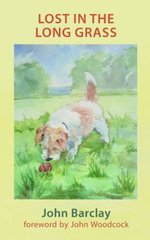Lost in the Long Grass
Martin Chandler |Published: 2013
Pages: 240
Author: Barclay, John
Publisher: Fairfield Books
Rating: 5 stars

I thoroughly enjoyed John Barclay’s last book, Life Beyond the Airing Cupboard, so I opened his latest offering with much optimism, particularly bearing in mind the preview I had already had in Tony Greig – A Tribute. I was not disappointed.
Whilst not an autobiography as such Life Beyond the Airing Cupboard is essentially autobographical in content for the reasons I explained when I reviewed it. In fact, although on the face of it Lost in the Long Grass appears to be a collection of biographical sketches of others, in many ways the two books are very similar as the basis of the essays that Barclay writes in the latter is his interactions, often but by no means always on the field of play, with his subjects.
Barclay’s angle of approach is still generally the self-deprecating one that he adopted in Life Beyond the Airing Cupboard. The first two essays for example, about Derek Underwood and Geoff Miller, are notable for being centred around matches in which he picked up a pair. But in truth besides being a decent all-rounder Barclay was, whatever he might at times imply to the contrary, a very astute county captain. Like all good leaders he watched his own players and the opposition’s very carefully. He understood what made men tick, and has the rare gift of being able to put the results of his observations into some very entertaining stories.
In the fullness of time Barclay took a management role on tour with England in the 1990s. That his people skills were undiminished is clear from what he writes about Michael Atherton, and indeed Ray Illingworth and David Lloyd, both of whom he encountered as a players as well. Ian MacLaurin crops up from the same era, and to add to that part of the Dramatis Personae who represent men who Barclay did not play with or against in the First Class game there are cameos about Tim Rice, Peter Eaton (the Hove groundsman) and Vic Cannings (a former Hampshire player who coached Barclay at Eton), as well as a smattering of scribes; John Woodcock, Jim Swanton, Robin Marlar and Christopher Martin-Jenkins.
There are other fine players who Barclay writes about, such as John Snow, Mike Brearley and Colin Cowdrey but not, slightly surprisingly, any of his less well known teammates. It is obvious from what we do read that Barclay could fill another book with tales of the likes of Mark Faber, Ralph Cowan and Garth Le Roux, and I sincerely hope that one day he does.
Some of the most interesting chapters in Lost in the Long Grass deal with the biggest names in the game from Barclay’s era. Ian Botham is here of course, and Barclay very cleverly and entirely convincingly likens the great English all-rounder to a Rainbow Trout. At Sussex he played with and indeed captained Imran Khan. As I remarked in my review of Life Beyond the Airing Cupboard I did wonder about the relationship between the two, and all becomes clear here. There are illuminating chapters too about Vivian Richards and Malcolm Marshall. A sure sign of the quality of Barclay’s prose is that despite the plethora of words already written about these giants of the game he manages to capture their essence, and indeed add something to his reader’s knowledge of them, in the space of around 3,000 words. The highlight of the book, for me, is the story that the essay on Maco is constructed around, and just in case you think I am waxing just a bit too lyrical about the book, publisher Fairfield Books have kindly agreed to allow us to reproduce the Marshall essay, and you can read it here.
There is one aspect of the book that, to say the least, caused me to raise my eyebrows. It is the closing chapter, entitled Robert, the subject of which is the Barclay family’s Lucas Terrier. I was immediately reminded of a flyer that was issued with one of the later editions of the Cricket Quarterly, a sought after and acclaimed periodical that appeared in the 1960s and was edited and for the most part written by the noted historian, Major Rowland Bowen. That flyer was headed Rob, and contained what I can only describe as a slightly disturbing tribute to Bowen’s recently deceased pet. Rob was a playful terrier as well, but the similarities end there as Bowen was, with apologies for the pun, beyond any doubt absolutely barking.
But I digress. There really is nothing to be critical of in Lost in the Long Grass. My eagle eye did spot a solitary spelling mistake, but I am reminded of that expression about people who live in glasshouses, so will say no more on that. If I were to make one small complaint it would arise out of the fact that the individual essays were clearly written on a piecemeal basis over a period of many months. What that means is that just occasionally, when the same match or incident features more than once, the editing is not quite seamless, and that can jar a little sometimes. However that does not detract one iota from the quality of the writing, which is five star stuff, so Lost in the Long Grass gets a maximum from me.







Leave a comment